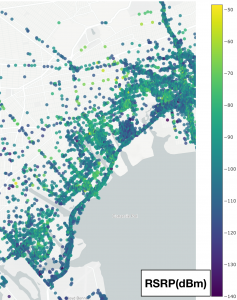Mobile signal strength (coverage) maps are of great importance to cellular operators for network planning and operation, however they are expensive to obtain, inaccurate in some locations, imperfectly reflective of call quality outcomes and potentially constructed from biased samples.
In this project, we develop both mobile network data collection tools as well as a principal ML prediction framework based on random forests to address the signal strength maps prediction challenges. First, we developed an Android user-space app that collects radio layer and other information needed for signal strength (LTERSRP) prediction as well as passive TCP/IP layer measurements.
Second, we propose a random forests (RFs)-based predictor, with a rich set of features including location as well as time, cell ID, device hardware and other features. We show that our RFs-based predictor can significantly improve the tradeoff between prediction error and number of measurements needed compared to state-of- the-art data-driven predictors, i.e., requiring 80% less measurements for the same prediction accuracy, or reduces the relative error by 17% for the same number of measurements.
Third, we propose a principal ML framework to address the issue of the biased sampling process as well as to match cellular operator objectives. We leverage two types of real-world LTE RSRP datasets to evaluate into the performance of different prediction methods and evaluate our framework: (i) a small but dense Campus dataset, collected on UC Irvine campus by our custom Android user-space app and (ii) several large but sparser NYC and LA datasets, provided by a mobile data analytics company.
Papers
Posters
Team
- Emmanouil (Manos) Alimpertis (UC Irvine)
- Carter T. Butts (UC Irvine)
- Athina Markopoulou (UC Irvine)
Contact: ealimper@uci.edu
